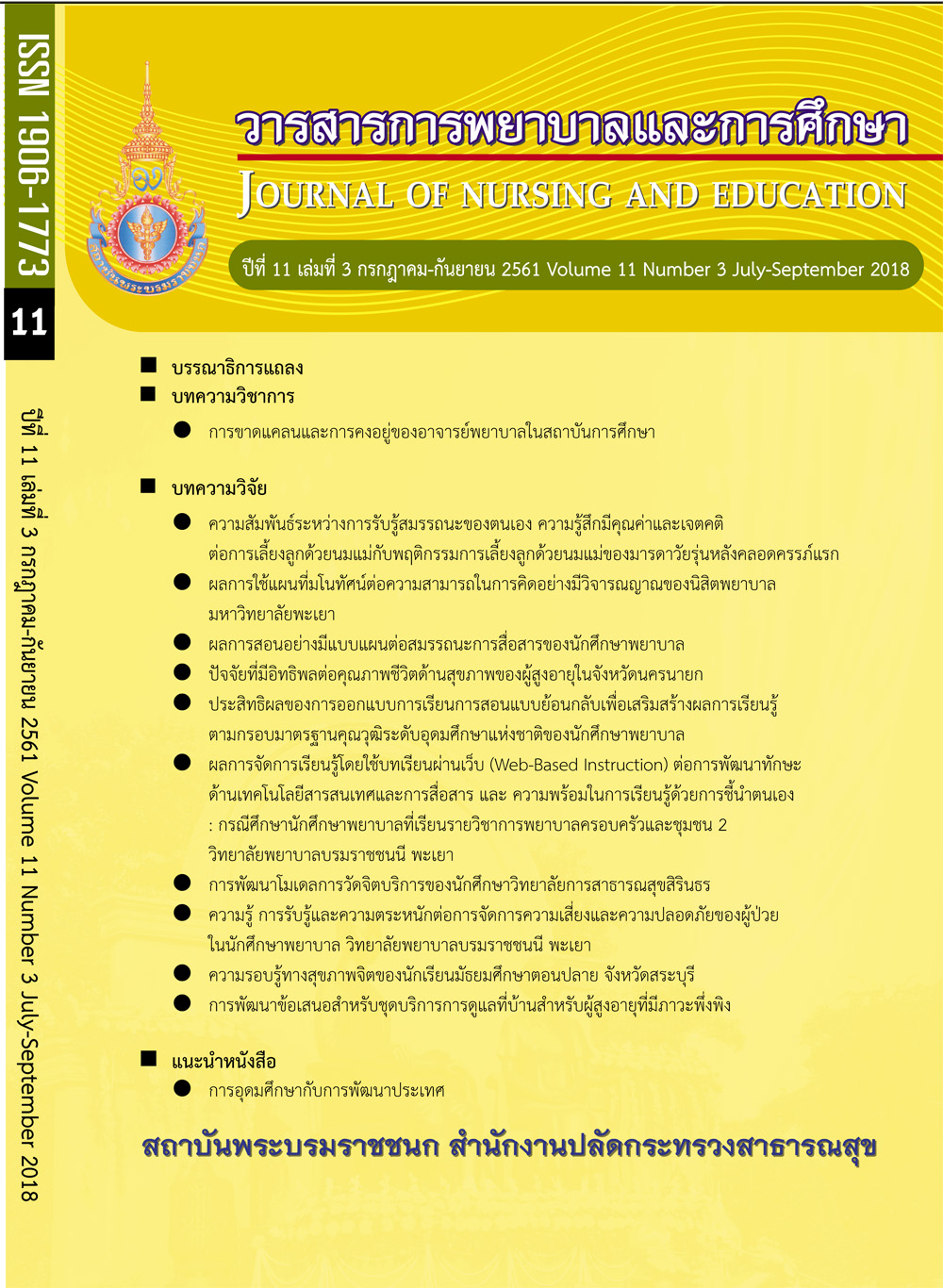ผลการใช้แผนที่มโนทัศน์ต่อความสามารถในการคิด อย่างมีวิจารณญาณของนิสิตพยาบาล มหาวิทยาลัยพะเยา
Effects of Concept Mapping on Critical Thinking Ability among Nursing Students of The University of Phayao
คำสำคัญ:
แผนที่มโนทัศน์, การคิดอย่างมีวิจารณญาณ, นิสิตพยาบาลบทคัดย่อ
บทคัดย่อ
การวิจัยกึ่งทดลองนี้ มีวัตถุประสงค์เพื่อศึกษาผลการใช้แผนที่มโนทัศน์ต่อความสามารถในการคิด
อย่างมีวิจารณญาณด้านคุณลักษณะและทักษะการคิดของนิสิตพยาบาล มหาวิทยาลัยพะเยา กล่มตัวอย่าง คือ นิสิตพยาบาล ช้นปีท 3 มหาวิทยาลัยพะเยา ท่ลงทะเบียนเรียนรายวิชาการพยาบาลผ้ใหญ 2 ป การศึกษา 2558 จำนวน 80 ราย ด้วยวิธีการสุ่มตัวอย่างอย่างง่าย กลุ่มตัวอย่างได้รับการสอนโดยแผนที่ มโนทัศน์ในการพัฒนาความสามารถในการคิดอย่างมีวิจารณญาณ จำนวน 1 ครั้งต่อสัปดาห์ ครั้งละ 30 นาที เป็นเวลา 8 สัปดาห์ติดต่อกัน เครื่องมือประเมินผลลัพธ์ ได้แก่ แบบประเมินคุณลักษณะการคิดอย่างมีวิจารณญาณ และแบบประเมินทักษะการคิดอย่างมีวิจารณญาณ วิเคราะห์ข้อมูลโดยใช้สถิต เชิงพรรณนาและสถิติทดสอบทีคู่ (paired t-test)
ผลการวิจัยพบว่า คะแนนเฉล่ยคุณลักษณะและทักษะการคิดอย่างมีวิจารณญาณโดยภาพรวม สูงกว่าก่อนการเรียนอย่างมีนัยสำคัญทางสถิต (p < .05) โดยคุณลักษณะการคิดอย่างมีวิจารณญาณ ด้านการชอบค้นหาความจริง การคิดอย่างวิเคราะห์ การคิดอย่างมีระบบ และด้านการเชื่อมั่นในการคิด สูงกว่าก่อนการเรียนอย่างมีนัยสำคัญทางสถิต (p < .05) และทักษะการคิดอย่างมีวิจารณญาณ ด้านทักษะ การประเมินสูงกว่าก่อนการเรียนอย่างมีนัยสำคัญทางสถิติ (p < .001)
เอกสารอ้างอิง
1. Panich V. Learning according to the 21st century. [Internet]. 2013 [cited2016/10/21]; Available from: https:// www.scbfoundation.com/stocks/5a/ file/1381311572hbs6y5a.pdf. (in Thai)
2. Facione, NC., Facione. PA. Externalizing the critical thinking in knowledge development and clinical judgment. Nursing Outlook, 1996; 44(3): 129-36.
3. Facione, PA. The disposition toward critical thinking: its character, measurement, and relationship to critical thinking skill. Informal Logic, 2000; 20(1): 61–84.
4. Yaemsuda, T. The development of social cognitive learning instructional system in nursing education using portfolio. Ph.D. Dissertation (Higher Education), Gradrate School Chulalongkorn University, 1999. (in Thai)
5. Sirisupluxana, P. Teaching nursing students to develop critical thinking skills. The Journal of Boromarajonani College of Nursing, Nakhonratchasima,
2013; 19(2): 5-19 (in Thai)
6. Chuenklin, T, & Laowreandee, W. The development of coaching model to enhance nursing instructors’ competency that promotes critical thinking skills of nursing students in Praboromarachanok Institute, Ministry of Public Health. Silpakorn Educational Research Journal,
2012; 4(1): 112-29. (in Thai)
7. Tawetanawanich, Y. The correlations
between students’ academic achievement, teaching learning activities, and their critical thinking, ability of students in the bachelor of nursing science program at Boromarajonani College of Nursing, Chakriraj. Ratchaburi
: Boromanajonani College of Nursing
Chakriraj 2011. (in Thai)
8. Klunklin, P, Thaiyapirom, N, and Woragidppoonpol, P. Learning experiences through reflective thinking diaries on practice of child health promotion among nursing students. Journal of Nursing and Education, 2007; 1 (2): 2-18. (in Thai)
9. Sanasuttipun, W., Tungjairob, V., Musiksukont, S., Lerthamatewe. W., Chanwatana, B. Effectiveness of small group discussion on critical thinking, self-directed learning, and learning satisfaction of Thai Nursing Students,
2009; 27(3): 8-16.
10. Waisurasing, L., Noparoojjinda, S. The development of instructional model using authentic learning approach to enhance achievement and critical thinking ability of Nursing students, Boromarajajonani College of Nursing, Suphanburi. Journal of Nursing and Education 2011; 4(3): 63-77. (in Thai)
11. Punthasee, P., & Sikaow, O. The effect
of clinical teaching by using case studies on the ability development of applying nursing process in clinical practice of nursing students. Thai Journal of Nursing Council, 2009; 24(3): 81-93. (in Thai)
12. Sirisopon, N. & Sopeerak, S. The development of web-based instruction model under constructionism for critical thinking development. Journal of Education Prince of Songkla University, Pattani Campus 2013; 24(3): 96-120. (in Thai)
13. Popil, I. Promotion of critical thinking by using case studies as teaching method. Nurse Education Today, 2011;
31(2): 204–07.
14. Tiwari ,A., Lai, P., So, M., Yeun, K. A comparison of the effects of problem- based learning and lecturing on the development of students’ critical thinking. Medical Education, 2006;
40: 547–54.
15. Kusol, K., Wongnart, S., Jaraeprapal, U. Effect of problem-based learning on critical thinking skills of Nursing students in children and adolescents nursing practicum. Journal of Nursing and Education, 2008; 1(2): 32-45. (in Thai)
16. Huang, YC., Chen, HH., Yeh, ML., Chung, Y.C. Case studies combined with or without concept maps improve critical thinking in hospital-based nurses: A randomized-controlled trial. International Journal of Nursing Studies, 2012; 49(6):
747–54.
17. Kerdsiri, S. The effect of improving the learning process by using concept mapping on Adult Nursing subject of Nursing student. Journal of The Royal Thai Army Nurses, 2006; 8(1): 41-47 (in Thai)
18. Tiansawad, S., Charuwatcharapaniskul, U., Phianmongkhol, Y. Effect of learning by using concept mapping on nursing student’s ability in planning nursing care. Nursing Journal 2007; 34(3):
1- 10. (in Thai)
19. Gerdeman, J.L., Lux. K,, Jean. J. Using concept mapping to build clinical judgment skills. Nurse Education in Practice, 2013; 13: 11-17.
20. Bandura, A. Social foundation of thought and action: A social cognitive theory. Englewood Cliffs NJ: Prentice-Hall, 1986.
21. Praboromarajchanok Institute for Health Workforce Development. Manual of internal quality assessment for college under Praboromarajchanok Institute for Health Workforce Development: criteria management and assessment for Nursing College. Nonthaburi Office of the Permanent Secretary, 2003.
(in Thai)
22. Srisatidnarakul, B. The methodology in nursing research. 4th ed. Bangkok: You and I intermedia, 2007. (in Thai).
23. Boonvas, K., Lertwanawattana, J., & Hamilton, S.S. The learning achievement using a mind mapped care plan to enhance nursing care planning capability and happiness of the third year nursing students in Borommarajonnani College of Nursing, Trang (BCNT). Journal of Nursing Division, 2016; 43(3): 9-23.
(in Thai)
24. Poungjuntaradej, N., & Pleankaew, P.
Factor related to nursing students’ critical thinking, Police Nursing College. JOPN, 2016; 8(1): 125-135. (in Thai)
25. Lausuwannagoon, W. Factors influencing the critical thinking of nursing, students studying at the Faculty of Nursing Burapha University. The Journal of Faculty of Nursing, Burapha University,
2003;11(3): 46-68 (in Thai)
26. King, M. & Shell, R. Critical thinking strategies: Teaching and evaluating critical thinking with concep tmaps. Nurse Educator 2002; 27: 214-216.
27. Thiamwong, L., Sunpaweravong, J., Suwanno, J., & McManus, M.S. Contributing theory to practice for elderly nursing: a pilot study. [Thesis]. Nakhon Si Thammarat: Walailak University, 2013. (in Thai)






